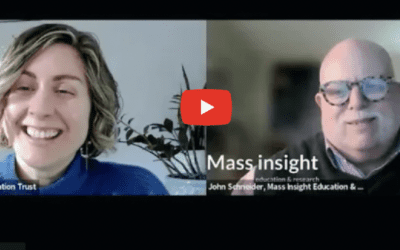Ms. Wolfe succeeds Dr. Susan Lusi, who will step down in June after leading the national nonprofit for eight years. April 18, 2024 – The Board of Directors of Mass Insight Education & Research has named Andrea Wolfe as the next President & CEO of the...
Is Great Teaching and Project-Based Learning the Recipe for Boosting AP Success?
As Mass Insight honors some of Massachusetts’ best STEM & English Advanced Placement (AP) teachers this month, new research is spotlighting the benefits of Project-Based Learning (PBL) for AP students.
In a randomized control trial, research scientists at the Center for Economic and Social Research at the USC Dornsife College of Letters, Arts and Sciences, found that high school students – taught AP US Government and AP Environmental Science with a PBL approach – outperformed peers on exams by 8 percentage points in the first year.
In year two, PBL students outperformed peers by 10 percentage points. These students were also more likely to earn a passing score of 3 or above with the chance to receive college credit.
The AP Environmental Science students in the controlled trial explored sustainability by conducting a personal environmental impact audit and were tasked with developing a proposal to reduce consumption.
For the US Government course trial, students conducted a mock presidential campaign, and assumed the roles of candidates, lobbyists, and media.
Clearly, learning by doing has a meaningful impact on improving learning. Good AP teachers know this instinctively. They create classrooms where students learn college-level content and participate in hands-on projects to develop skills for college and work. Now, through the USC research, we have the evidence to back up this practice.
Great AP teachers, like those that Mass Insight is honoring, know that by leveraging Project-Based Learning in their courses they are helping more students become eligible to earn college-credit while in high school.

Recent Posts
Mass Insight Launches New Service to Tackle Chronic Absenteeism
The Targeted Intervention: Chronic Absenteeism will take a community-based exploratory approach to understanding the experiences of chronically absent students and efforts to increase student attendance. March 18, 2024 – Mass Insight Education & Research...
An Interview with Kristen Hengtgen of The Education Trust
https://youtu.be/1ZfxNShHJOU?si=d1a1GoVrgrDWT5Cu Kristen Hengtgen, Ph.D. is a senior analyst on The Education Trust's P-12 policy team and co-author of their new report, Increasing Access to Advanced Coursework in Massachusetts. In this interview, she joins Mass...
You may also like
An Interview with Kristen Hengtgen of The Education Trust
https://youtu.be/1ZfxNShHJOU?si=d1a1GoVrgrDWT5Cu Kristen Hengtgen, Ph.D. is a senior analyst on The Education Trust's P-12 policy team and co-author of their new report, Increasing Access to Advanced Coursework in Massachusetts. In this interview, she joins Mass...
Creating the conditions for greater success of systemically disadvantaged students in AP: Next steps for the Massachusetts AP STEM & English program
Recently the New York Times published an article entitled, Why is the College Board Pushing to Expand Advanced Placement? The article focuses on an important issue: there’s been greater growth in AP participation for Black and Latino students and students living in...
Recentering Our Communities in School Transformation: An Equity-First Approach
This is the final post in Mi’s Revisiting the Turnaround Challenge blog series. In Revisiting the Turnaround Challenge, we examined the outcomes of three “turnaround zones” implemented by urban public school districts in partnership with Mi between 2012-2019. Our goal...


